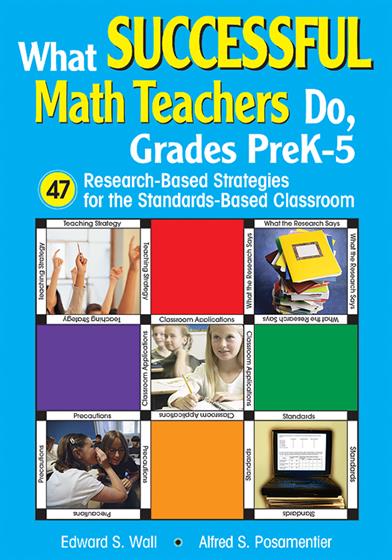Prologue
Acknowledgments
About the Authors
1. Numbers and Operations
Grades PreK-2
1. Encourage young children's exploration and understanding of relationships among numbers.
2. Encourage young children's understanding of addition and subtraction and how they relate to each other.
3. Encourage young children's fluent computation.
Grades 3-5
4. Encourage an understanding of the structure of numbers and relationships among numbers.
5. Encourage an understanding of the meanings of multiplication and division and how they relate to each other.
6. Encourage students to compute fluently and make reasonable estimates.
2. Algebra
Grades PreK-2
7. Encourage young children's systematic sorting and classification as they work with a variety of patterns, geometric shapes, and data.
8. Encourage young children's systematic exploration of the general principles and properties of operations such as addition and subtraction.
Grades 3-5
9. Encourage the expression and generalization of mathematics relationships.
10. Encourage further understanding of multiplicative structures through application and analysis of the distributivity of multiplication over addition.
3. Geometry
Grades PreK-2
11. Encourage young children's exploration of characteristics and properties of two- and three-dimensional shapes.
12. Encourage young children's application of similarity transformations to analyze geometric situations.
13. Encourage young children's use of visualization and spatial reasoning in their exploration of geometric shapes.
Grades 3-5
14. Encourage students' exploration and mathematical analysis of the properties of two-dimensional geometric shapes.
15. Encourage students' use of geometric transformations to analyze mathematical situations.
16. Encourage students' use of visualization, spatial reasoning, and geometric modeling to solve problems.
4. Measurement
Grades PreK-2
17. Encourage young children's exploration and understanding of measurement concepts and relationships.
18. Encourage young children to accurately apply appropriate tools and techniques to linear measurement.
Grades 3-5
19. Encourage students' exploration and understanding of measurement concepts and relationships.
20. Encourage students' appropriate application of conventional measuring tools in varied situations.
5. Data Analysis and Probability
Grades PreK-2
21. Encourage young children's collection, display, and organization of objects and data.
22. Encourage the idea in young children that data, graphs, and charts give information.
23. Encourage young children's informal explorations of probability.
Grades 3-5
24. Encourage students to explore questions they find personally relevant and that can be addressed by data collection and analysis.
25. Encourage students to become more precise in their mathematical descriptions of data.
26. Encourage students to explore and evaluate issues of representativeness and inference.
27. Encourage students' exploration and quantification of simple probabilistic events.
6. Problem Solving
Grades PreK-2
28. Encourage young children to ask mathematical questions and to identify essential mathematical information.
29. Assess young children's abilities to solve problems through examination of student work and conversations.
Grades 3-5
30. Encourage students' development and application of problem-solving strategies.
31. Select rich, appropriate, and challenging problems and orchestrate their use.
7. Reasoning and Proof
Grades PreK-2
32. Encourage young children to explain their thinking by stating their reasons.
33. Ask questions that encourage young children to make conjectures and to justify their thinking.
Grades 3-5
34. Encourage children to reason about the relationships that apply to the numbers, operations, or shapes that they are studying.
35. Focus on general mathematical structures and relationships.
8. Communication
Grades PreK-2
36. Encourage young children's verbal and written communication of mathematics concepts and ideas.
37. Expect young children to explain their thinking and give them opportunities to talk with and listen to their peers.
Grades 3-5
38. Encourage students to share their thinking, to ask questions, and to justify their ideas.
39. Provide models for student dialogue about mathematics.
9. Connections
Grades PreK-2
40. Encourage young children to make connections among mathematical ideas, vocabulary, and representations.
41. Make links between routine school activities and mathematics.
Grades 3-5
42. Encourage students to see that mathematics is a web of closely connected ideas.
43. Select tasks that help students explore and develop increasingly sophisticated mathematical ideas.
10. Representation
Grades PreK-2
44. Encourage young children to represent their mathematical ideas and procedures in varied ways.
45. Create a learning environment that supports and encourages children's use of multiple representations.
Grades 3-5
46. Encourage students to use representations to support, clarify, and extend their mathematical ideas.
47. Choose tasks that embody rich and varied representational structures.
Epilogue
Index



